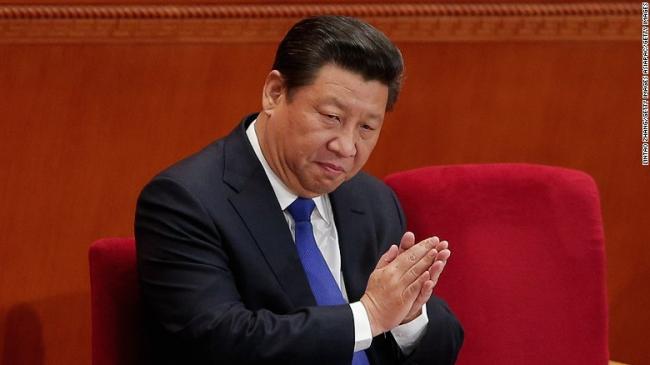Xi JinPing’s Ideologies In Chinese Constitution, Attains Iconic Status as Mao

Beijing: President Xi Jinping on Tuesday attained iconic status enjoyed by modern China's founder Chairman Mao Zedong, with his name and ideology enshrined in the Constitution of the ruling CPC, as he secured a second five- year term with sights firmly set on an unprecedented third.
The once-in-five-years Congress of the Communist Party of China (CPC) on its final day approved Xi's ideology to be written into its Constitution, which is in addition to the title of "core leader" conferred on him last year that analysts say enhances his leadership status above other leaders of the party.
Till now, only the thoughts of Mao and his successor Deng Xiaoping were enshrined in the Constitution of the world's longest ruling Communist Party, interpreting the complex doctrine of Marxism with Chinese characteristics.
The thoughts of Deng, China's reformist leader, were added posthumously. CPC historians compare 64-year-old Xi with party founder Mao. The thoughts of two of Xi's predecessors, Jiang Zemin and Hu Jintao, were mentioned in the Constitution but not their names. This makes Xi only the third leader to have his thoughts on governance enshrined, which will now be part of school textbooks all over China.
But Xi, who is regarded as the most powerful leader heading the party, presidency and the military in the last five years did not have his way in the Congress as he had to settle for a compromise to let his closest aide, Wang Qishan, 69, to retire in an apparent trade off with other powerful factions in the party to get his name enshrined in the Constitution.
The name of Wang, who headed the massive anti-corruption drive targeting "tigers and flies" in the party in which over a million officials punished, was not found in the 204-strong list of elected members of the Central Committee, the top most policy body of the CPC.
The "election" to the Central Committee held in a most secretive functioning of the party, is essential to get into the 25-member Politburo and the seven-member Standing Committee which virtually rules the country. The names of the Politburo and the Standing Committee will be formally announced tomorrow.
Xi and Premier Li Keqiang, the number one and two in the party hierarchy, have been elected to the Central Committee ensuring their second terms mostly based on the unofficial two-term norm for top leaders followed by the party. Tomorrow, Xi and Li along with other members of the Standing Committee would make a formal appearance before the media in a nationally televised event.
It is not yet clear whether the Standing Committee will have five members as Xi reportedly preferred, or seven like in the outgoing committee, or nine as under previous president Hu's tenure. Like in the inaugural session the of week-long Congress on October 18, Hu and Jiang along with a host of retired leaders shared the front row with Xi and Li, in a show of unity.
While speculation was rife that Xi may have to settle for a seven-member Standing Committee with candidates representing the factions of Jiang and Hu in the Standing Committee as a compromise, analysts said Xi's masterstroke enshrining his name in the Constitution firmed up his position as a leader above the leaders, denting the collective leadership system followed by the party till now. This may ensure his reported plans to continue beyond two terms securing his place similar to Mao. Xi's thoughts were stated to be a new guideline for the party to continue in power in the modern era, specially in the next few decades to ensure the country, currently the world's second largest economy, becomes moderately prosperous.
Unanimously agreed by party delegates, the constitutional amendment juxtaposed 'Xi Jinping's Thought on Socialism with Chinese Characteristics for a New Era' along with Marxism- Leninism, Mao Zedong Thought, Deng Xiaoping Theory, the Theory of Three Represents, and the Scientific Outlook on Development.
In response to contemporary developments and by integrating theory with practice, Chinese Communists, with Xi as their chief representative, have given shape to 'Xi Jinping's Thought on Socialism' since the last CPC National Congress, the resolution said.
It has "systematically addressed the major question of our times -- what kind of socialism with Chinese characteristics the new era requires us to uphold and develop and how we should uphold and develop it," it said.
Putting the significance of the constitutional amendment in perspective, Robert Lawrence Kuhn, author and long-term American scholar on China who moved closely with Chinese leaders and scholars, said the inclusion of Xi's thoughts in the Constitution and his "core leadership" conferred on him by the party previously puts him "substantially ahead of others" in the CPC. (PTI)





